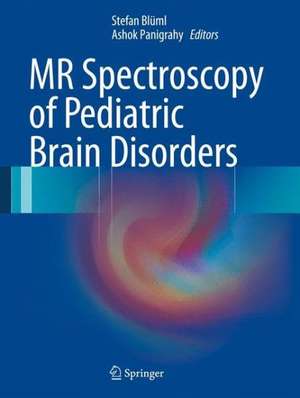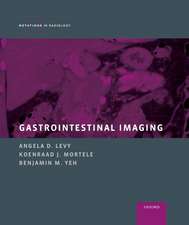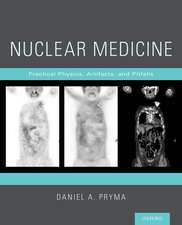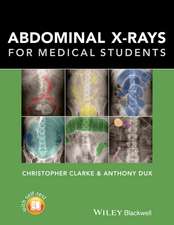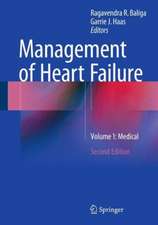MR Spectroscopy of Pediatric Brain Disorders
Editat de Stefan Blüml, Ashok Panigrahyen Limba Engleză Paperback – 16 dec 2014
There are several books available that describe applications of MRS in adults. However, to the best of our knowledge there is currently no book available that focuses exclusively on applications in pediatrics. MR spectroscopy in the pediatric population is different from adults for two main reasons. Particularly in the newborn phase the brain undergoes biochemical maturation with dramatic changes of the "normal" biochemical fingerprint. Secondly, brain diseases in the pediatric population are different from adult disorders. For example, brain tumors, which are mostly gliomas in the adults, often originate from different cell types and are also more diverse even within the same type and grade of tumor. This diversity of diseases and its implications for MR spectroscopy has not been addressed sufficiently in the literature, we believe. The target audience for "MR Spectroscopy of Pediatric Brain Disorders" are thus both clinicians and researchers involved with pediatric brain disorders. This includes radiologists, neurologists, neurooncologists, neurosurgeons, and more broadly the neuroscience and neurobiology community.
This book will provide the necessary background information to understand the basics of MR spectroscopy. This will be followed by a detailed discussion of the normal biochemical maturation which will highlight the metabolic differences between the pediatric and adult brain. Thereafter, in SECTION I individual chapters will address various pediatric brain disease families. Of particular importance for pediatrics are case studies. For that reason, SECTION II will contain a large number of case studies. This will be particularly important for clinicians who may want to see examples of MRS for various conditions. A standardized format will be used for case reports that allow the reader to quickly understand the history of each case presented and the significance of the findings. The case reports will also include information from other imaging modalities to point out any added value of MRS in addition to conventional studies and clinical information. This section is necessary because the format of providing more complete information about individual patients is not practical for the chapters in SECTION I.
| Toate formatele și edițiile | Preț | Express |
|---|---|---|
| Paperback (1) | 862.56 lei 6-8 săpt. | |
| Springer – 16 dec 2014 | 862.56 lei 6-8 săpt. | |
| Hardback (1) | 1133.36 lei 38-44 zile | |
| Springer – 30 noi 2012 | 1133.36 lei 38-44 zile |
Preț: 862.56 lei
Preț vechi: 907.97 lei
-5% Nou
Puncte Express: 1294
Preț estimativ în valută:
165.05€ • 179.85$ • 139.08£
165.05€ • 179.85$ • 139.08£
Carte tipărită la comandă
Livrare economică 23 aprilie-07 mai
Preluare comenzi: 021 569.72.76
Specificații
ISBN-13: 9781489987631
ISBN-10: 1489987630
Pagini: 416
Ilustrații: XIV, 402 p.
Dimensiuni: 210 x 279 x 22 mm
Greutate: 0.93 kg
Ediția:2013
Editura: Springer
Colecția Springer
Locul publicării:New York, NY, United States
ISBN-10: 1489987630
Pagini: 416
Ilustrații: XIV, 402 p.
Dimensiuni: 210 x 279 x 22 mm
Greutate: 0.93 kg
Ediția:2013
Editura: Springer
Colecția Springer
Locul publicării:New York, NY, United States
Public țintă
Professional/practitionerTextul de pe ultima copertă
Magnetic resonance spectroscopy (MRS) is a user-friendly, widely available imaging modality that can be of particular use for brain conditions, including tumors, metabolic disorders, and systemic diseases. MR Spectroscopy of Pediatric Brain Disorders is a groundbreaking survey of the many applications of MRS in pediatrics, taking into account how dramatically the young brain matures as well as the unique presentation of many brain disorders in this population. The first section of this book carefully explains the basic science and practice of MRS. The following section is filled with case studies designed for the clinician who wants to quickly and easily understand how to use MRS for various pediatric brain conditions and disorders. Ideal for the radiologist, neurologist, neurooncologist, neurosurgeon, and even the neuroscience and neurobiology community, MR Spectroscopy of Pediatric Brain Disorders is a fascinating reference for clinicians and researchers alike.
Caracteristici
This text allows practitioners to master the basics of MRS, which allows physicians to obtain biochemical information about the tissues of the human body in a noninvasive way Includes supplementary material: sn.pub/extras
